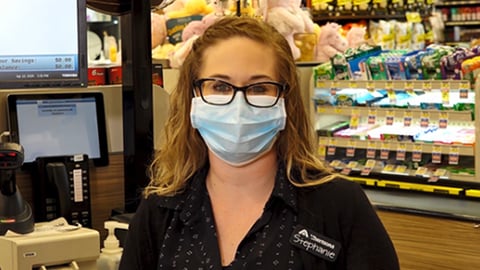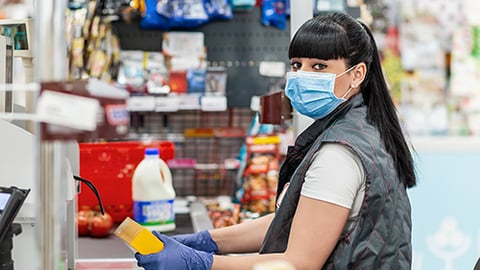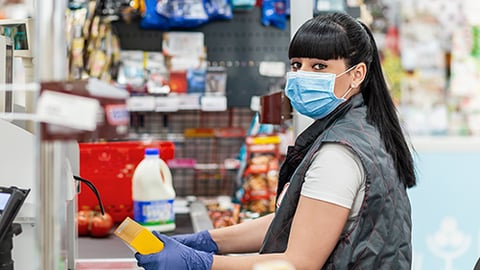To Mask or Not To Mask — Retailers Set Fresh Policies
Nope, nyet, not really.
Even as mask mandates spread through the retail world, some merchants have taken a different approach that favors voluntary compliance over enforcement.
Dollar Tree and Family Dollar (owned by Dollar Tree) reportedly have reversed their mask mandates for shoppers. As of Tuesday afternoon, had voluntary mask policies for shoppers listed on their websites, not requirements, unless local or state political authorities had set their own mask mandate for people in public. Retail workers for those two chains still have to wear masks.
“In accordance with guidelines from the Centers for Disease Control and Prevention (CDC), we are requiring all Associates and vendors to wear face coverings when inside our stores,” is how Family Dollar put it, via rules lasted updated on Thursday. “We also request that our customers wear face coverings, and require face coverings where required by state or local ordinance. The Company is providing face masks to Associates.”
Dollar Tree offered this via its own pandemic FAQ on its website: “We are providing non-medical face masks and gloves to all Associates to wear during their shifts. Associates may also choose to wear their own gloves and cloth face coverings.”
Mask Change
Meanwhile, a major mask holdout in the food retail world has changed its position on the pandemic protection tool. As major retailers such as Walmart, Target, Aldi and others rushed to announced their own mask mandates for shoppers, Southeastern Grocers said it would not require shoppers to do the same inside its own stores, which include Winn-Dixie. But on Monday, SEG reversed course and said its mask mandate would start on July 27.
“As we have navigated through the complexities and challenges of the pandemic, we have progressively shaped our operations and are continuing to update our policies to best protect all those who depend upon us,” said Joe Caldwell, the company’s director, corporate communication and government affairs. “This unprecedented period requires a willingness to be adaptable and flexible to ever-changing circumstances, and we will continue to adjust as needed over time.”
Enforcement Frustration
In announcing its mandate, Southeastern Grocers pointed out the understandable frustration for food retailers and other types of merchants during this point of the pandemic — a time when not all state and local authorities have set their own mask mandates, or are even enforcing ones already on the books.
“We believe that the enforcement should be placed upon our state and federally elected officials, and we will continue to work with our peers in the retail industry to advocate for this sensible mandate to be passed into law to remove the burden from employers and their heroic frontline associates,” Caldwell said. Indeed, a few quick moments reviewing online videos of customers freaking out over store mask mandates and making life harder for food retail workers serve to support Caldwell’s point.
Even so, weight has clearly shifted in favor of requiring shoppers to wear masks while inside stores. For example, on the same day that Walmart and Sam's Club announced a mandatory mask policy, the National Retail Federation urged all retailers to do the same. The trade association has issued a statement for a nationwide policy that requires customers to wear face coverings or masks to protect the health and well-being of customers, associates and partners during the coronavirus pandemic.
The largest U.S. union for food retail workers has come out in favor of mask mandates throughout the country, and polls continue to show majority support among U.S. consumers for those requirements. And the last week or so has brought a steady parade of other retailers — major and not — announcing their own masks mandates, which apply even in places where political authorities have declined to so the same.
Jacksonville, Fla.-based SEG, and its subsidiaries Bi-Lo LLC and Winn-Dixie Stores Inc., are privately held companies that own and operate regional grocery store chains Bi-Lo, Winn-Dixie Stores, Fresco y Más, and Harveys Supermarket in the southeastern United States, with 550 stores in Alabama, Florida, Georgia, Louisiana, Mississippi, North Carolina and South Carolina. The company is No. 13 on Progressive Grocer’s 2020 PG 100 list of the top grocers in the United States.
Dollar Tree operates 15,370 stores across 48 states and five Canadian provinces. Stores operate under the brands of Dollar Tree, Family Dollar, and Dollar Tree Canada. Dollar Tree is No. 30 on Progressive Grocer’s 2020 PG 100 list of the top food retailers in North America, while Family Dollar is No. 32.





